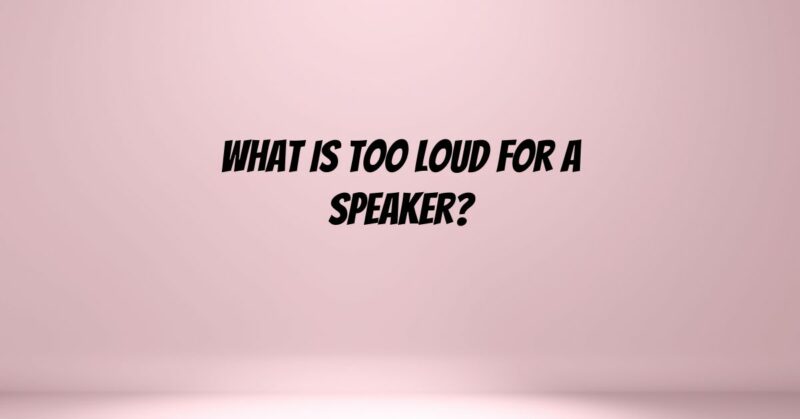Speakers are integral components of audio systems, and understanding their limits is essential to ensure they perform optimally and have a long lifespan. One common concern among audio enthusiasts is determining what volume levels are “too loud” for their speakers. In this article, we’ll explore the factors that affect speaker loudness limits, potential consequences of pushing speakers too hard, and how to protect your speakers from damage.
Factors Affecting Speaker Loudness Limits:
- Power Handling Capacity: Each speaker has a specified power handling capacity, typically measured in watts (RMS). This rating indicates the maximum continuous power the speaker can handle without being damaged. Exceeding this limit can lead to distortion, overheating, and potentially speaker damage.
- Amplifier Power: The power output of the amplifier driving the speakers is a critical factor. If the amplifier delivers more power than the speakers can handle, it can easily push them to their limits, resulting in damage or distortion.
- Speaker Sensitivity: Speaker sensitivity, measured in decibels (dB), indicates how efficiently a speaker converts electrical power into sound. More sensitive speakers can produce higher volume levels with less amplifier power.
- Listening Environment: The size of your listening space, room acoustics, and the proximity of the speakers to the listening position also affect perceived loudness. Larger rooms may require more power to achieve a certain volume level.
Consequences of Playing Speakers Too Loud:
- Distortion: Pushing speakers beyond their limits can result in audible distortion. Distorted sound is unpleasant and can compromise the listening experience.
- Overheating: Continuous high-volume playback can cause speakers to overheat. Excessive heat can damage the voice coils and diaphragms, leading to permanent speaker damage.
- Voice Coil Damage: The voice coil is a critical component of a speaker. Playing at excessive volumes can cause the voice coil to heat up excessively, leading to its deformation or even a complete failure.
- Reduced Lifespan: Playing speakers too loud too frequently can significantly reduce their lifespan. Speaker components wear out faster when consistently operated near or beyond their power limits.
Protecting Your Speakers:
To ensure your speakers remain in good condition and provide optimal sound quality:
- Match Amplifier Power: Ensure that the amplifier’s power output closely matches the power handling capacity of your speakers. Overpowering speakers is a common cause of damage.
- Mind the Volume: Pay attention to volume levels and avoid pushing your speakers to their limits regularly. Use the volume control responsibly.
- Quality Audio Sources: Ensure that your audio sources and recordings are of high quality, as low-quality recordings can introduce distortion even at moderate volumes.
- Monitor Temperature: Be mindful of the temperature of your speakers. If they become excessively hot during prolonged use, it’s a sign of potential damage.
- Room Acoustics: Optimize your room’s acoustics to improve sound quality. Proper acoustic treatment can help you achieve better sound at lower volumes.
Conclusion:
While there isn’t a universal “too loud” for all speakers, it’s crucial to understand and respect the power handling capacity of your specific speakers. Pushing speakers beyond their limits can result in distortion, overheating, and potentially permanent damage. Responsible volume management, proper amplifier-speaker matching, and attention to speaker sensitivity are key factors in maintaining speaker health and ensuring a satisfying listening experience.

